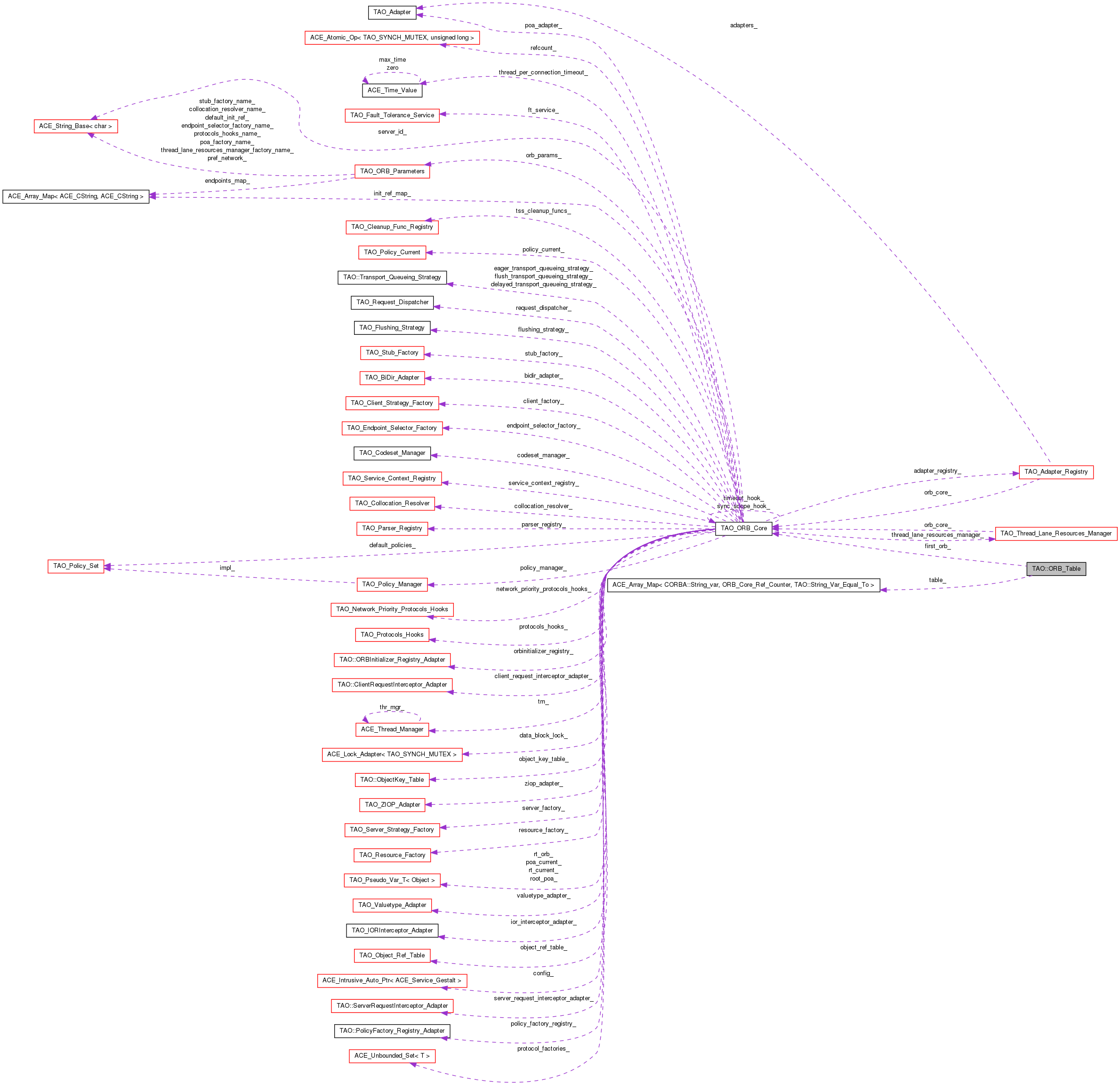|
TAO 2.0.4
|
|
TAO 2.0.4
|
Keep a table with all the ORBs in the system. More...
#include <ORB_Table.h>

Public Types | |
| typedef ACE_Array_Map < CORBA::String_var, ORB_Core_Ref_Counter, TAO::String_Var_Equal_To > | Table |
| typedef Table::key_type | key_type |
| typedef Table::data_type | data_type |
| typedef Table::value_type | value_type |
| typedef Table::size_type | size_type |
| typedef Table::iterator | iterator |
Public Member Functions | |
| ORB_Table (void) | |
| Constructor. | |
| ::TAO_ORB_Core * | first_orb (void) |
| void | set_default (char const *orb_id) |
| void | not_default (char const *orb_id) |
| Table * | table (void) |
| Accessor to the underlying table_. | |
| TAO_SYNCH_MUTEX & | lock (void) |
| Return reference to underlying lock. | |
The canonical ACE_Map methods. | |
| iterator | begin (void) |
| iterator | end (void) |
| int | bind (const char *orb_id,::TAO_ORB_Core *orb_core) |
| ::TAO_ORB_Core * | find (const char *orb_id) |
| int | unbind (const char *orb_id) |
Static Public Member Functions | |
| static ORB_Table * | instance (void) |
| Return a unique instance. | |
Private Member Functions | |
| ORB_Table (const ORB_Table &) | |
| void | operator= (const ORB_Table &) |
| ::TAO_ORB_Core * | find_i (char const *orb_id) |
Private Attributes | |
| ::TAO_SYNCH_MUTEX | lock_ |
| Lock used to synchronize access to the internal state. | |
| bool | first_orb_not_default_ |
| Table | table_ |
| The underlying table. | |
| ::TAO_ORB_Core * | first_orb_ |
| The first ORB created by the user. | |
Keep a table with all the ORBs in the system.
CORBA::ORB_init() is supposed to return the same ORB if the user specifies the same ORBid, either in the ORB_init() parameter or in the -ORBid option. This class is used to implement that feature. It is also useful when trying to determine if an object reference is collocated or not.
| typedef Table::data_type TAO::ORB_Table::data_type |
| typedef Table::iterator TAO::ORB_Table::iterator |
| typedef Table::key_type TAO::ORB_Table::key_type |
| typedef Table::size_type TAO::ORB_Table::size_type |
| typedef ACE_Array_Map<CORBA::String_var, ORB_Core_Ref_Counter, TAO::String_Var_Equal_To> TAO::ORB_Table::Table |
| typedef Table::value_type TAO::ORB_Table::value_type |
| TAO::ORB_Table::ORB_Table | ( | void | ) |
Constructor.
| TAO::ORB_Table::ORB_Table | ( | const ORB_Table & | ) | [private] |
| TAO::ORB_Table::iterator TAO::ORB_Table::begin | ( | void | ) |
Return TAO_ORB_Core corresponding to ORB with given orb_id.
| int TAO::ORB_Table::bind | ( | const char * | orb_id, |
| ::TAO_ORB_Core * | orb_core | ||
| ) |
Return TAO_ORB_Core corresponding to ORB with given orb_id.
| TAO::ORB_Table::iterator TAO::ORB_Table::end | ( | void | ) |
Return TAO_ORB_Core corresponding to ORB with given orb_id.
| TAO_ORB_Core * TAO::ORB_Table::find | ( | const char * | orb_id | ) |
Return TAO_ORB_Core corresponding to ORB with given orb_id.
| ::TAO_ORB_Core* TAO::ORB_Table::find_i | ( | char const * | orb_id | ) | [private] |
Return TAO_ORB_Core corresponding to ORB with given orb_id. (underlying unlocked implementation).
| TAO_ORB_Core * TAO::ORB_Table::first_orb | ( | void | ) |
Obtain the first ORB for the ORB_Core_instance() implementation.
| TAO::ORB_Table * TAO::ORB_Table::instance | ( | void | ) | [static] |
Return a unique instance.
| TAO_SYNCH_MUTEX & TAO::ORB_Table::lock | ( | void | ) |
Return reference to underlying lock.
| void TAO::ORB_Table::not_default | ( | char const * | orb_id | ) |
| void TAO::ORB_Table::operator= | ( | const ORB_Table & | ) | [private] |
| void TAO::ORB_Table::set_default | ( | char const * | orb_id | ) |
| TAO::ORB_Table::Table * TAO::ORB_Table::table | ( | void | ) |
Accessor to the underlying table_.
| int TAO::ORB_Table::unbind | ( | const char * | orb_id | ) |
Return TAO_ORB_Core corresponding to ORB with given orb_id.
::TAO_ORB_Core* TAO::ORB_Table::first_orb_ [private] |
The first ORB created by the user.
bool TAO::ORB_Table::first_orb_not_default_ [private] |
Variable to check if the first ORB decides not to be the default.
::TAO_SYNCH_MUTEX TAO::ORB_Table::lock_ [private] |
Lock used to synchronize access to the internal state.
Table TAO::ORB_Table::table_ [private] |
The underlying table.
 1.7.4
1.7.4